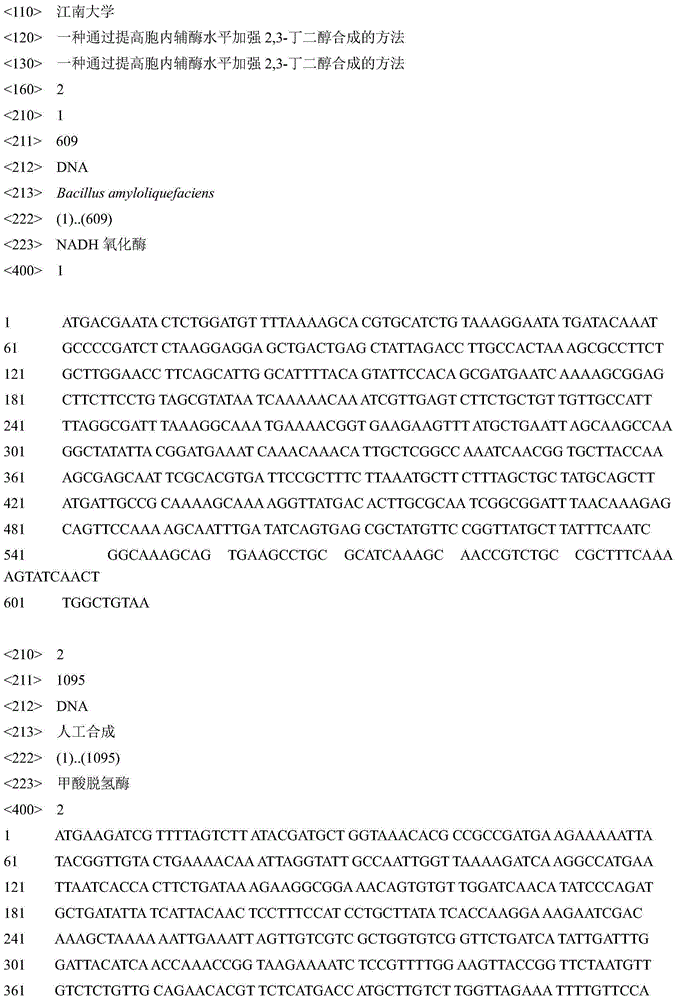Method for enhancing 2,3-butanediol synthesis by improving intracellular coenzyme level
A technology of butanediol and content, applied in the field of genetic engineering, can solve problems that do not meet industrial safety production
- Summary
- Abstract
- Description
- Claims
- Application Information
AI Technical Summary
Problems solved by technology
Method used
Image
Examples
Embodiment 1
[0008] Example 1: Amplification of target gene and construction of recombinant Bacillus amyloliquefaciens
[0009] The specific process of obtaining fragment nox::fdh is as follows:
[0010] Firstly, using the chromosomal DNA of strain B10-127 as a template, using primers P1 and P2, the nucleotide sequence of the gene nox was amplified by PCR technology as shown in SEQ ID NO:1, and the purified nox gene was ligated to the plasmid pMD-18T Above, the recombinant plasmid T-nox was constructed, and after double enzyme digestion verification, the recombinant plasmid was constructed successfully. Subsequently, primers P3 and P4 were used to amplify the gene fdh with the nucleotide sequence shown in SEQ ID NO: 2 by PCR, and the purified fdh gene was digested with restriction enzymes NdeI and MluI, and the same as the above two Restriction enzyme digested plasmid pMA5-HpaII was ligated to obtain pMA5-HpaII-fdh, which was amplified by PCR with primers P5 and P6 to obtain HpaII-fdh; and ins...
Embodiment 2
[0014] Example 2: Verification of fermentation performance of original bacteria and recombinant bacteria
[0015] (1) Seed cultivation
[0016] Pick a single colony from the activation plate and inoculate it in the seed culture medium. The seed culture temperature is 37℃, the shaker speed is 160r / min, and the culture time is about 12h. The composition of the seed culture medium: yeast extract 5g / L, tryptone 10g / L, NaCl10g / L.
[0017] (2) Fermentation culture
[0018] The initial fermentation culture volume is 2.5L, and the fermentation medium components used are as follows:
[0019] Fermentation medium composition: glucose 160g / L, corn steep liquor 5g / L, urea 3g / L, sodium citrate 6g / L, K 2 HPO 4 4g / L, MgSO 4 0.2g / L; adjust the pH of the above fermentation medium to 6.5 with 5mol / L NaOH, and sterilize it at 121°C for 30 minutes.
[0020] Fermentation and fermentation conditions: the above-mentioned cultivated seed liquid is inoculated into the fermentation medium according to the inocul...
PUM
 Login to View More
Login to View More Abstract
Description
Claims
Application Information
 Login to View More
Login to View More - R&D
- Intellectual Property
- Life Sciences
- Materials
- Tech Scout
- Unparalleled Data Quality
- Higher Quality Content
- 60% Fewer Hallucinations
Browse by: Latest US Patents, China's latest patents, Technical Efficacy Thesaurus, Application Domain, Technology Topic, Popular Technical Reports.
© 2025 PatSnap. All rights reserved.Legal|Privacy policy|Modern Slavery Act Transparency Statement|Sitemap|About US| Contact US: help@patsnap.com



